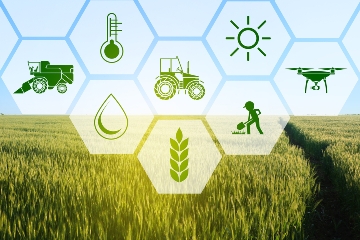Agri
B.Tech. Agricultural Engineering
About the Department
Welcome to Department of Agricultural Engineering
The Department of Agricultural Engineering is a new B.Tech. Programme established in the year 2022 with an intake of 30 students. The programme covers the wide areas about agriculture, modern farming, resource conservation, farming equipment and machineries, IoT based crop production, soil and water modeling using software etc.
Department aims the practice agriculture in field by providing frequent field classes, technical experts guidance. For acquiring practical familiarities the college provides an irrigation land with all the necessary provisions such as tractor, bore wells, sumps etc.
The department is equipped with modernized food and agricultural processing laboratory, on field irrigation systems. The department encourages the entrepreneurial development with necessary webinars, technical visits, hands on programmes, workshops, etc. The department also provides technology based supports to entrepreneurs and farmers in the aspect of establishing small scale industries.
Vision
To be a centre of excellence in producing highly skillful women engineers in the field of agriculture engineering who can promote sustainable agricultural development in and around globe.
Mission
- To prop up women in gaining education and knowledge in the field of agricultural engineering that infuses the technology in tradition methodologies.
- To endorse students in research and training and leading them to meet out the current needs in the field of agricultural engineering.
- To develop new technologies with integrated knowledge that can turn the geo greener.
REGULATION 2021
PROGRAMME EDUCATIONAL OBJECTIVES
PEO1:To train and educate students with general knowledge and skills in agricultural water management, agricultural production process, farm machinery and farm management.
PEO2:To provide a sound theoretical knowledge in engineering principles applied to agriculture.
PEO3:To prepare students for a successful agricultural engineering career integrating all aspects of engineering in agriculture.
PEO4:To develop innovative capacity of students for increasing agricultural production with scarce water resources available.
PEO5:To impart positive and responsive out their mission as engineers. reach attitudes, initiative and creative thinking in their mission as engineers.
PEO6:To understand ethical issues and responsibility of serving the society and the environment at large.
PROGRAMME OUTCOMES
PO1: Engineering knowledge:Apply the knowledge of mathematics, science, engineering fundamentals, and an engineering specialization to the solution of complex engineering problems.
PO2: Problem analysis: Identify, formulate, review research literature, and analyze complex engineering problems reaching substantiated conclusions using first principles of mathematics, natural sciences, and engineering sciences.
PO3: Design/development of solutions: Design solutions for complex engineering problems and design system components or processes that meet the specified needs with appropriate consideration for the public health and safety, and the cultural, societal, and environmental considerations.
PO4: Conduct investigations of complex problems: Use research-based knowledge and research methods including design of experiments, analysis and interpretation of data, and synthesis of the information to provide valid conclusions.
PO5: Modern tool usage: Create, select, and apply appropriate techniques, resources, and modern engineering and IT tools including prediction and modeling to complex engineering activities with an understanding of the limitations.
PO6: The engineer and society: Apply reasoning informed by the contextual knowledge to assess societal, health, safety, legal and cultural issues and the consequent responsibilities relevant to the professional engineering practice.
PO7: Environment and sustainability: Understand the impact of the professional engineering solutions in societal and environmental contexts, and demonstrate the knowledge of, and need for sustainable development.
PO8: Ethics: Apply ethical principles and commit to professional ethics and responsibilities and norms of the engineering practice.
PO9: Individual and team work: Function effectively as an individual, and as a member or leader in diverse teams, and in multidisciplinary settings.
PO10: Communication: Communicate effectively on complex engineering activities with the engineering community and with society at large, such as, being able to comprehend and write effective reports and design documentation, make effective presentations, and give and receive clear instructions.
PO11: Project management and finance: Demonstrate knowledge and understanding of the engineering and management principles and apply these to one's own work, as a member and leader in a team, to manage projects and in multidisciplinary environments.
PO12: Life-long learning: Recognize the need for, and have the preparation and ability to engage in independent and life-long learning in the broadest context of technological change.
PROGRAM SPECIFIC OUTCOMES
PSO1:To make expertise in design and engineering problem solving approach in agriculture with proper knowledge and skill.
PSO2:To enhance the ability of the students to formulate solutions to real-world problems pertaining to sustained agricultural productivity using modern technologies.
PSO3:To inculcate entrepreneurial skills through strong Industry-Institution linkage.


